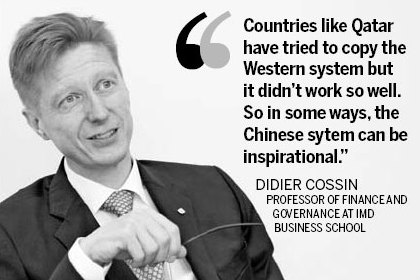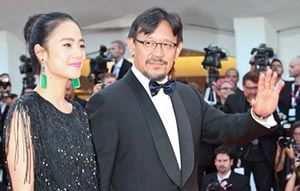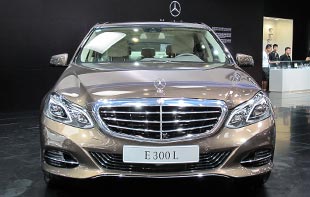


A top financial expert believes unique governance model will lead the way
Chinese banks are championing a unique corporate governance structure that could provide lessons for both Western and emerging markets, said Didier Cossin, professor of finance and governance at Switzerland's IMD Business School.
The 48-year-old academic, who has advised many banks around the world, said that Chinese banks have devised a structure which ensures checks and balances between different directors but also ensures the views of the state, a key shareholder, are heard.
Cossin said such a structure is unfamiliar to Western banks because traditionally they do not have governments as key shareholders. Cossin said this structure can provide an alternative model for banks in other emerging markets that have large state ownership.
"I was in Qatar, and I know they are very interested in the Chinese model," Cossin said. "For Qatar, the tradition has been to draw lessons from the West, but many Qatari corporations have large state ownership, and in the West we don't have a great tradition of state management of private-style assets.
"Countries like Qatar have tried to copy the Western system but it didn't work so well. So in some ways, the Chinese system can be inspirational."
With the assistance of a Chinese colleague, Cossin studied Chinese banks' corporate governance structures during an 18-month research project at the Industrial and Commercial Bank of China.
The result of this research has since been turned into case study material distributed by IMD and used by business schools globally for teaching purposes.
One innovative feature at ICBC he identified is the creation of full-time non-executive directors, who are seconded to ICBC from the Ministry of Finance and Central Huijin Investment Ltd, an investment vehicle that China's State Council set up to represent the state's interests in the country's financial sector.
At ICBC, there are six such full-time non-executive directors, who participate in board discussions to make sure that whatever decisions are made will take into account the interests of the state, a key shareholder in ICBC.
Also on the ICBC board are four executive directors, and three part-time independent directors, who are experts in their fields and contribute independent views to discussions.
Cossin said the structure implemented at ICBC is common to China's biggest state-owned banks. It was created during the rapid banking reforms of recent years, changing banks from being completely State-controlled to being market-driven and revenue-generating enterprises, although the state remains a major shareholder.
In comparison, Western banks typically have only executive directors and independent part-time non-executive directors, Cossin said.
 Models at Ford pavilion at Chengdu Motor Show
Models at Ford pavilion at Chengdu Motor Show
 Brilliant future expected for Chinese cinema: interview
Brilliant future expected for Chinese cinema: interview
 Chang'an launches Eado XT at Chengdu Motor Show
Chang'an launches Eado XT at Chengdu Motor Show
 Hainan Airlines makes maiden flight to Chicago
Hainan Airlines makes maiden flight to Chicago
 Highlights of 2013 Chengdu Motor Show
Highlights of 2013 Chengdu Motor Show
 New Mercedes E-Class China debut at Chengdu Motor Show
New Mercedes E-Class China debut at Chengdu Motor Show
 'Jurassic Park 3D' remains atop Chinese box office
'Jurassic Park 3D' remains atop Chinese box office
 Beauty reveals secrets of fashion consultant
Beauty reveals secrets of fashion consultant